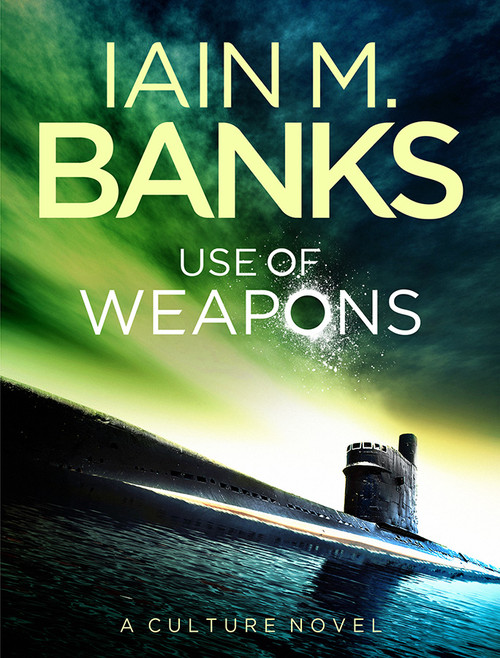Introduction by Ken MacLeod.
About the Book:
In the course of a varied and prolific career, the late Iain M. Banks produced some of the most memorable science fiction of the 20thcentury. The heart of his achievement was a sequence of novels featuring his signature creation: The Culture. First published in 1990, Use of Weapons was the third novel in the series, and it remains one of Banks’s most astonishing – and complex – accomplishments.
The Culture is the designation for a vast conglomerate of advanced races populated by human, humanoid, and artificially intelligent entities. Its purpose: to intervene, often with unintended consequences, in the affairs of less developed civilizations. The protagonist of Use of Weapons is Cheradenine Zakalwe, an “outsider” recruited by the Culture’s Special Circumstances division to serve, wherever needed, as a roving galactic operative. His story, which dominates the novel, proceeds along two narrative paths.
The first of these tells the story of Zakalwe’s latest mission on behalf of the Culture. His job: to travel to a remote star system currently drifting into political instability and make contact with a former colleague named Beychae. Zakalwe’s quest is told in straightforward chronological order. A second, complementary narrative proceeds in reverse order, moving backward in time to encompass the origin and history of Zakalwe’s involvement with the Culture. Eventually, the two narratives will intersect, culminating in a revelation both surprising and inevitable.
Despite its place in an ongoing series of thematically related books, Use of Weapons is an independent novel that can be read and enjoyed both by newcomers and by the author’s many longtime fans. This is science fiction as it should be written: flamboyant, endlessly inventive, and constantly, compulsively readable. It is the clear product of a master storyteller who died too soon, leaving a vast, indelible impression behind.
Lettered: 26 leatherbound copies, signed by Ken MacLeod, housed in a custom traycase
Limited: 400 numbered cloth bound copies signed by Ken MacLeod
Introduction (excerpt)
by Ken MacLeod
Use of Weapons is the first Culture novel. It wasn’t the first published, but it was the first written. In it, the Culture—a Galaxy-spanning post-scarcity civilization—is exuberantly explored with the joy of a new discovery. It’s a utopia perhaps unique in literature: almost every reader would like to live there. Like most utopias, it’s discovered and explored by a stranger, an outsider, the man the Culture knows as Zakalwe. Unlike most utopias, it’s an action story. The outsider is not an observer but a protagonist. A mercenary soldier of the Culture, he’s a regrettable necessity, a tool, a weapon. Sometimes a king-maker, he’s always a pawn, but he has a mind and will of his own.
This man they call Zakalwe burns on the page. It’s his story, from the end to the beginning and back. In composition, and conception, the character came first. Banks set out to write a tale of a flawed, conflicted fighter in the service of an unambiguously good society. He had the man: a character very like him is the voice of a poem Banks wrote in his late teens, “Memoirs,” now lost except to my memory, which retains the lines:
Into the night the city burned, and all next day
...
because the smell had grown too weak to bear
...
I am disillusioned now
But I still write poems.
So he had the mercenary. That left the paymasters. Banks designed his utopia by imagining the kind of society in which he himself would most like to live: Long healthy life! Great sex! Leisure and abundance! Fun and games! Space exploration! Faster-than-light travel! Freedom! For all!
Working out the conditions for the existence of a society that could satisfy these modest desires for every conscious being within its domain required an entire imaginary physics and cosmology. In the novels, it’s referred to as the Reality. In conversation, Banks called it the Cosmic Onion theory, an explication of which usually ended with an airy wave of the hand and a blithe “…but of course you have to think of it in seven dimensions.” Our expanding universe is, in higher dimensions, an expanding shell, with slightly older and younger universes as concentric shells outside and inside, which themselves…and so on, ad infinitum. In the membrane of hyperspace between adjacent universes lies the Grid, an inexhaustible source of energy. Tapping into it enables a society without scarcity and therefore without toil, money, classes, social domination, or significant coercion.
Oh, and no religion too, thank you very much, but definitely something to kill or die for. Without that, he wouldn’t have his mercenary, or his story.
- authors_list:
- Iain M. Banks
- binding:
- Hardcover
- book_case:
- None
- book_length:
- 440 pages
- book_type:
- Novel
- country_of_manufacturer:
- United States
- is_subpress:
- Yes
- print_status:
- In Print
- year:
- 2020



